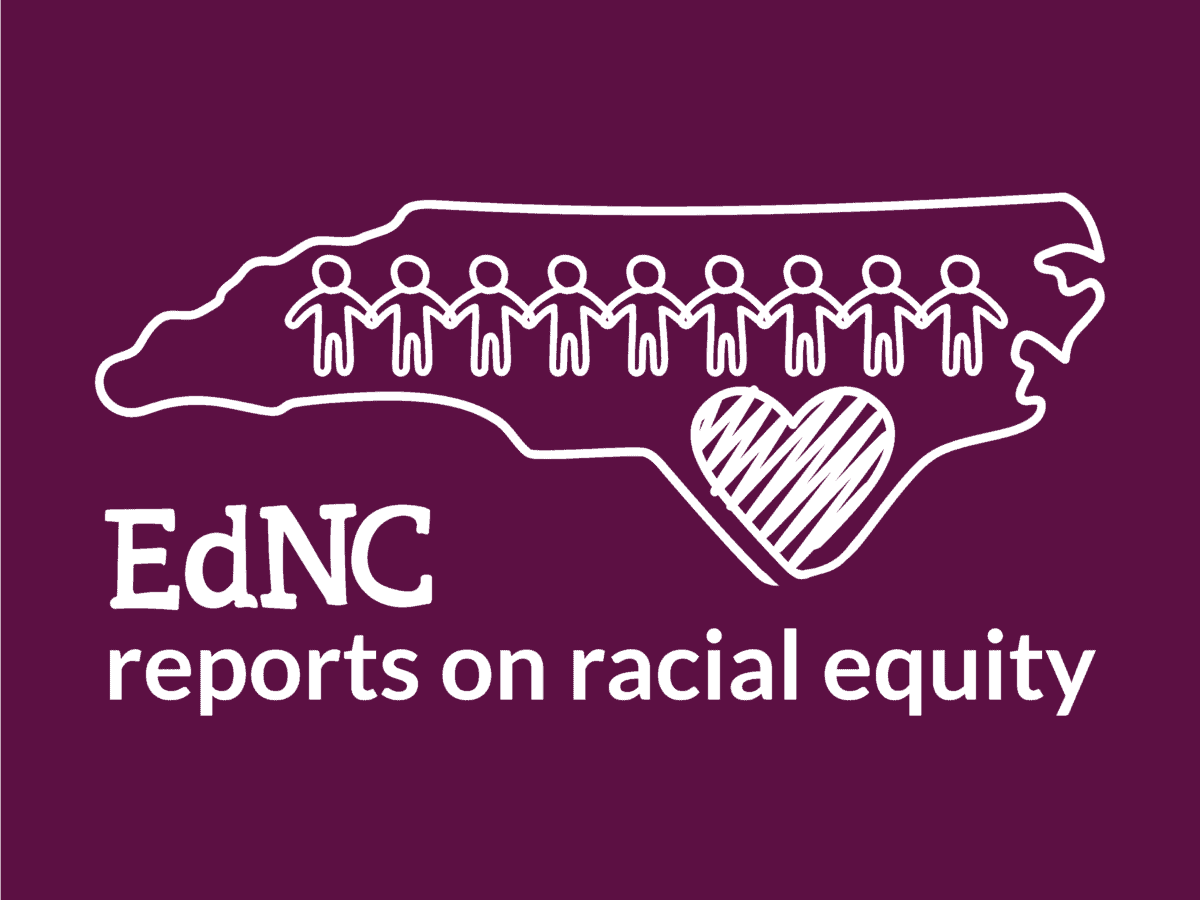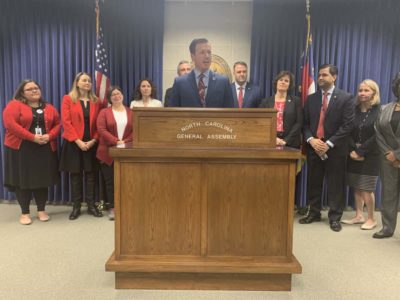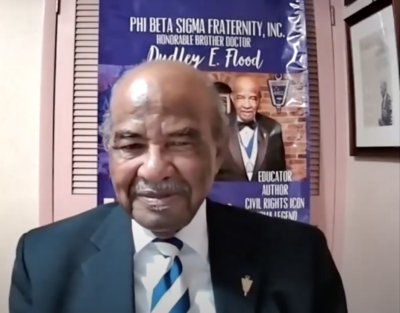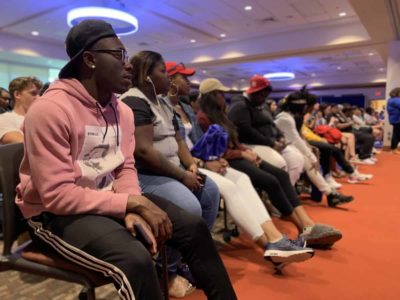
|
|
Patricia Hilliard found herself dreaming one day and rapidly planning for reality the next.
During a meeting with her supervisor in January 2020, Hilliard was encouraged to bring her passions into her work at the Friday Institute for Educational Innovation. For as long as she can remember, one of those passions has been fighting for justice in education.
Her plan, which she formed in the final days before the pandemic, was to organize a small conference for Spring 2021 — for about 500 attendees. Then COVID-19 forced school buildings to close and laid bare the inequities in education. Shortly after, George Floyd was murdered, rallies for justice broke out across the country, and educators here and nationwide re-examined equity in schools.
Hilliard moved quickly to meet the moment and, in partnership with her colleague Laura Albrecht, pulled together the Friday Institute’s inaugural NC Conference on Educational Equity nearly a year earlier and much larger than planned. More than 2,000 attendees joined via Zoom a year ago.
“There was just so much focus on equity and so many inequities happening in schools that we moved the conference to July of 2020,” she said. “And the reception was overwhelming … No one thought it was controversial.”
This year, the climate is much different.
Starting with the fifth annual EduColor Summit, which kicks off today, and the Friday Institute’s second NC Conference on Educational Equity next week, a series of educational equity conferences are continuing pro-justice work — but now amid the din of opposition.
State legislatures across the country are considering and passing bills supposedly aimed at banning critical race theory, which proponents label as a dangerous ideology that promotes bias. Opponents of these bills, including North Carolina’s House Bill 324, say the proposals don’t ban critical race theory so much as demonstrate why critical race theory was born into scholarship in the first place — because they would hinder schools from teaching about systemic racism, and from engaging in much-needed anti-bias training.
That’s why organizers of equity conferences say the work is important. These equity conferences, which continue after next week with the Public School Forum’s Color of Education in October, refocus the conversation on students and bring pro-justice educators into community with one another.
“It is very much about telling folks, hey, we are here; we are ever present; we are not going anywhere,” said José Vilson, executive director and co-founder of EduColor, a national organization. “Because people want us to step into fear. They want us to be as fearful as they are about the so-called world that’s being taken away from them. To the contrary, actually we just need to make room, and make better room, for the folks who you consistently and historically marginalize.”
Pushing forward — for the students
Hilliard said she has taken measures to safeguard the conference because of the political climate, but never considered canceling it.
“In some ways, I feel like this conference is even more important this year than last year,” she said. “It’s important for us to continue to move forward … That’s what motivates me, and that’s where I want us to keep our focus — no matter what distractions try to come our way.”
Vilson said the work felt urgent to him last year, in part, because he sensed resistance coming. It felt like being in the ocean, he said, standing amid small waves when you can see a big wave rising in the distance. The work was needed last year to prepare for the big wave, and it’s needed this year to push through it.
“That first wave has already hit us in the form of anti-critical race theory laws,” he said. “EduColor is well positioned to say, not so much that we told you so, but that we still have work to do here. And we’re not going to go anywhere, no matter how much people want us to hide.”
For Lauren Fox at the Public School Forum, the urgency is present — but the resistance is also a sign of positive change.
“I think we’re seeing this backlash because a lot of people did wake up and a lot of people who weren’t as aware of structural racism and systemic inequities prior to last summer are now having those conversations and waking up to the realities,” she said.
And continuing those conversations, more than getting stuck in old debates, is the priority for Hilliard. While it’s mostly adults having these debates and making classroom decisions, she said, it’s the kids who will be most affected.
“This debate is ignoring the students,” she said. “It’s ignoring the students who are already marginalized, and it’s further marginalizing them. I want to bring them back to the forefront with this conference.”
Conferences focus on action — and community
Vilson said he’s often engaged in conversation with people who disagree with him, and sometimes they seem very angry.
“When you get underneath all the hate and all the anger,” he said, “a lot of this is really people being very afraid of the things that they don’t know, that they’re not aware of.”
Both Vilson and Hilliard said their conferences will raise awareness, but they aren’t focused on the resistance or proving the existence of systemic racism. The conference agendas accept racism as fact — as the truths that Black and Brown educators and students have reported for years. Beyond that, the conferences are about action.
Both EduColor and the Friday Institute will feature student panels, as well as panels for district leaders, principals, and teachers to talk about practices that have worked for them. The Friday Institute also will feature community organizations that work with schools, as well as a successful national model out of Philadelphia.
Working with the theme, “Hope. Opportunity. Liberation,” Hilliard said she wanted to emphasize that while hope is good, it is not enough.
“Where are we opening up those opportunities for students to demonstrate the grit in the classroom and out of the classroom once they graduate in the community?” she said.
The conferences are about community, too. Particularly during the pandemic, when so many students and educators were at home, it could feel lonely grappling with educational injustice.
“We’re unapologetically about making sure that our people are taken care of,” Vilson said. “So many of our people feel like they’re isolated and all by themselves. Anti-CRT laws are taking advantage of how isolated a lot of teachers feel right now. So we’re trying to bring something that’s wholly different and say, ‘Just because your classroom doors are closed does not mean that every other door isn’t open to you.’”
Why the equity work remains critical
Hilliard and Vilson both say they wanted classroom teachers on panels during their conferences, because they’re on the frontlines and see the importance of pro-justice work. They are with the kids who are hurting most, and they grapple with the laws and policies that have long produced opportunity gaps for Black and Brown students.
Some of the teachers on those front lines in North Carolina say conversations about race and equity are vital, and not just in teaching facts about isolated, historical events.
In defense of HB 324 two weeks ago, Lt. Gov. Mark Robinson said he learned about such things as slavery, the Wilmington massacre, Jim Crow and the civil rights movement when he was in school. He said students should learn about these things, and he joined Senate President Pro Tem Phil Berger in saying the bill would not ban teaching them.
But “What about connecting those incidents to observe their cumulative effects?,” Vilson asks. “What about the consequences of persistent action and inaction?,” Hilliard asks.
In Rodney Pierce’s classroom late last year, he showed video of a Malcolm X speech, “Who taught you to hate yourself?”
Pierce, an eighth-grade social studies teacher in Nash County, didn’t teach dogma or make students pledge solidarity with the message. He didn’t espouse the teachings of Elijah Muhammad, whom Malcolm X was defending in the speech. Pierce asked questions, and he fostered discussion about how people of color are perceived.
“A lot of this stuff, these kids learn at home or they learn through the media,” Pierce said. “So we have to be careful that we don’t just fall for what’s depicted.”
Would this make white students feel guilt? Discomfort? Even if it did, what about the consequences of ignoring the message?
In Shannon Atako’s second grade classroom in Wake County, she said, she can’t ignore these consequences. They showed up in front of her in a most surprising way.
She recalls asking her class of 7- and 8-year olds how they would feel if a family wasn’t allowed to move into their neighborhood because of the way they looked. The kids universally rejected the notion.
But what if the reason was because the family was Black?
One student spoke up, saying he wouldn’t want a Black family to move in because Black people are thieves. Atako was shocked.
“I’m like, ‘But you’re Black,'” she said. “[He] said, ‘I know that Black people steal because I heard it on the news.’ Some of it was maybe from things that they had been told.”
To ask history teachers to skip truths about America’s history of racism because they might cause discomfort is also asking them to skip these truths that already cause discomfort — and worse, denial of opportunity — to students in marginalized communities, said Wake County history teacher Battle Watkins.
“You don’t want to make kids feel bad or tell them to feel guilt,” Watkins said. “School should be an uplifting place.”
That doesn’t mean you ignore the history and don’t critically examine it, though.
“In my course, in helping my students understand the journey that is America, there are going to be some hard parts,” Watkins said. “And that’s true in our own lives as well. But if we ignore those hard parts, we miss opportunities to learn how to improve ourselves. And maybe we repeat those same mistakes over again. So choosing not to look at them or deal with them, you know, there are consequences for that, too.”
Fox says the anti-CRT legislation introduces uncertainty for teachers who want to provide students with this opportunity to grow. That’s one thing these conferences hope to address: helping teachers navigate the ambiguity.
“I completely understand why teachers are feeling that way,” said Fox, who added that the Public School Forum is hosting a town hall dialogue on HB 324 between educators, students, and lawmakers on August 6. “There’s a lot of uncertainty about what the bill really is saying and what the implications are for teachers that are teaching history and current events. So we want to bring educators into those conversations and hear from them about it.”




